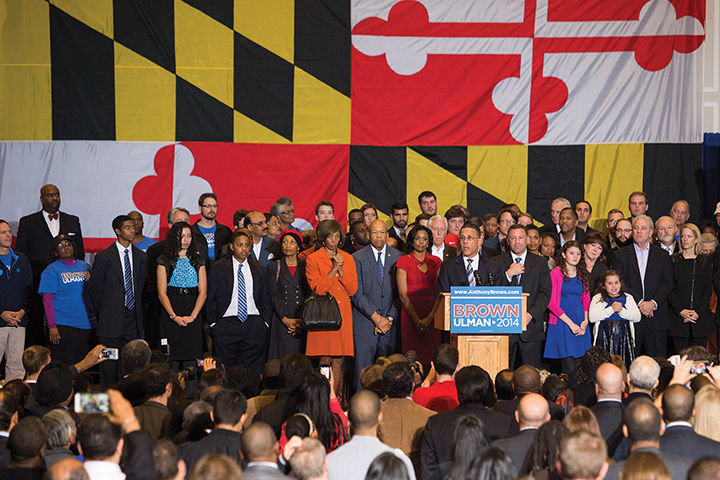
Anthony Brown conceded the 2014 Maryland gubernatorial race to opponent Larry Hogan. Republican Hogan won 52-46 in a state where Democrats outnumber Republicans 2 to 1.
When Lt. Gov. Anthony Brown won the Democratic primary by nearly 30 percent in June, supporters did not expect him to be giving a concession speech to Republican Larry Hogan on election night.
“Tonight this campaign ends, but our journey as a people and a state continues,” Brown told his supporters at Riggs Alumni Center last night. “I’d like to congratulate Larry Hogan and his family and his team on tonight’s victory.”
Hogan defeated Brown by a margin of 52 percent to 47 percent, a surprise after Brown led in the polls throughout his campaign.
“I was really shocked not only that Hogan won, but that the margin was so big,” Student Government Association President Patrick Ronk said. “It definitely took me off-guard. It took a lot of people off-guard.”
A major key to Hogan’s victory was his showing in Baltimore County, where he defeated Brown by 21 percent. When Republican Robert Ehrlich was elected in 2002, he won the county by 23 percent.
Brown’s campaign focused on the successes of the O’Malley administration. He highlighted their ability to keep college tuition increases capped at 3 percent annually for the last four years while tuition skyrocketed in other parts of the country. He also touted progressive laws passed regarding gun control, same-sex marriage, marijuana decriminalization and the minimum wage.
But Brown was attacked throughout the campaign for his connection with O’Malley’s tax increases. Taxes were the most important issue to state voters, according to a recent poll conducted by this university and The Washington Post.
“It all comes down to taxes,” said Luke Pinton, SGA government affairs director. “You can’t run a campaign solely on social issues.”
While Brown promised not to raise taxes, state voters still sided with the candidate who pledged to begin rolling back taxes as soon as he takes office.
“People aren’t happy with where we are, and that causes people to think about elections and who they should vote for,” U.S. Sen. Ben Cardin (D-Md.) said.
Rep. Dutch Ruppersberger (D-Md.) said he wished Brown focused more on his past military service during his campaign.
“The lieutenant governor did not define himself as I would like him to be defined,” Ruppersberger said.
A Republican is taking the governor’s office for the first since Ehrlich was elected in 2002, but Democrats still hold strong majorities in the state Senate and House of Delegates. For this reason, Ben Kramer, president of this university’s College Democrats chapter, said he does not think Hogan will have a major impact on state policy.
“The legislature is deeply blue in Annapolis,” Kramer said. “I don’t know, practically, how much a Hogan victory would impact policy. Symbolically, it’s pretty important.”
Ronk said he’s not sure where Hogan stands on college tuition. Hogan spent much of the campaign fending off claims from the Brown campaign that he supported the Ehrlich tuition increases while he was state Cabinet secretary. Hogan repeatedly said he does not support increasing tuition, but Ronk said he would like to see him better articulate his vision.
“I would really like to see what he has to say for college students moving forward and how he is going to make college more affordable,” Ronk said.
Brown defeated Hogan in three of the state’s 23 counties — Montgomery, Prince George’s and Charles counties — as well as Baltimore City.
In Prince George’s County, he won by a margin of 84 percent to 15 percent. But only 38 percent of registered voters in the county cast a ballot, not including absentee ballots, down from slightly more than 42 percent when O’Malley was re-elected in 2010.
Voter turnout on this campus, however, was higher than in recent elections. At Stamp Student Union, 817 people voted Tuesday, up from 656 in 2010.
Brown began his Election Day in Prince George’s County, casting his ballot at St. Joseph’s Catholic Church in Upper Marlboro. He spent the afternoon in Baltimore before returning to College Park, where he gave his concession speech just after midnight.
“This was a tough campaign, but it was tough because there’s a lot at stake, a lot worth fighting for,” Brown said. “I know that government is difficult, demanding work. Larry is seeing a tough road ahead of him and I wish him the very best as they travel that road.”



